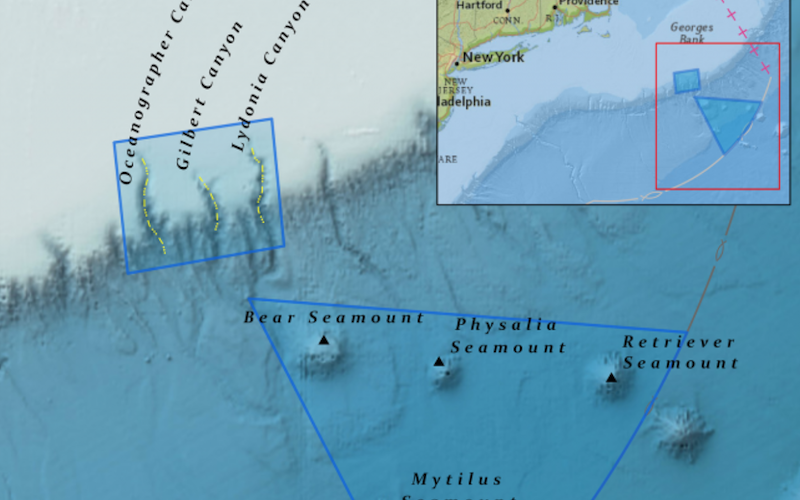Fishing industry leaders are urging President Biden to resist pressure for creating or expanding Marine National Monuments in U.S. ocean waters before he leaves office in January 2025.
“Prohibiting the sustainable utilization of our nation’s waters via unilateral presidential action will harm the Americans we represent, employ, and feed while failing to advance effective and durable marine conservation,” a coalition of more than 150 fishing and seafood industry associations, businesses, and community leaders wrote in a Nov. 21 letter to the White House.
The letter, circulated by the fishing industry advocacy group Saving Seafood, stressed the federal government should stick with the proven national fisheries management system of the Magnuson-Stevens Act law and eight regional fishery management councils.
The law and the regional councils “provide a proven, science-based approach to ocean conservation,” the letter contends, and “offer the flexibility and stakeholder engagement necessary to address dynamic ocean management challenges, which are essential as ocean ecosystems undergo rapid changes.”
Donald Trump’s win in the presidential election could portend a huge upheaval in U.S. government policy, from his campaign promise to kill offshore wind energy projects, to conservative legal activists’ drive to sharply curtail the power of federal regulatory agencies like the National Oceanic and Atmospheric Administration.
The stakes are high for the economics of U.S. fisheries, which “generate $321 billion in sales, support nearly 2.3 million jobs, and are vital to countless American communities where alternative employment opportunities may be limited,” the letter states. “The Magnuson-Stevens Act requires U.S. fisheries to be managed to sustainable harvest rates and to achieve broader marine biodiversity goals.”
The possibility of Biden making dramatic moves that may close areas to fishing is a central concern to the industry.
“Marine National Monuments are created using static area-based protections and without the rigorous impact review required by the normal rulemaking process,” the letter says. “They are a tool that will more often prove ill-suited to the dynamic ocean management challenges that lie ahead.”
“Any action of this kind before Jan. 20 would come at an especially difficult time. Most of our sector has faced acute economic hardship in recent years,” the letter says. “Furthermore, in many regions fishermen have been confronting federal government actions that encourage offshore wind development in some of America’s most historically important fishing grounds.’
“Against this backdrop, the mere threat of Marine National Monuments creates harmful business uncertainty. New designations would further harm our sector, needlessly constraining fishing activity despite U.S. fisheries delivering enormous public benefits and complying with the most rigorous management system in the world,” the letter says. “In this context, any move to create or expand a Marine National Monument anywhere in the U.S. EEZ (Exclusive Economic Zone) before you leave office will be met by significant opposition of the fishing and seafood sector and coastal communities.”
The federal Antiquities Act, originally used in the early 20th century to protect ancient Native American settlements and relics in the Southwest, has allowed presidents power to declare areas protected by executive action.
Already between 2006 and 2016, five Marine National Monuments have been created across almost 1.2 million square miles of U.S ocean territory by presidential proclamations.
Former president George W. Bush invoked the law in 2006 to create the Papahanāumokuākea Marine National Monument around the westernmost Hawaii islands. Former president Barack Obama later expanded its boundaries around four-fold.
During his administration Obama established the Northeast Canyons and Seamounts National Marine Monument, over resistance from the fishing industry. In June 2020 then-President Trump signed an executive order that fell short of repealing the monument designation, but reinstated some commercial fishing there.
In September 2021, the new Biden administration reinstated the Northeast Canyons restrictions at the behest of environmental groups. The renewed designation continued a pattern of federal policy whiplashes as partisan politics steer agency actions under successive administrations.
The industry letter warns that earlier administrations unilaterally establishing Marine National Monuments “has also alienated stakeholders in ways that have fundamentally undermined legitimacy and thus durability.”
Biden’s reversal and reinforcement of the Northeast Canyons restrictions raised a ruckus from New England fishermen and conservative legal activists. In a March 2021 opinion Supreme Court Chief Justice John Roberts raised concerns about the Antiquities Act, and allowing the president to apply monument designations on land or sea.
The industry letter quotes Roberts’ opinion, which appeared to invite litigants to challenge the Antiquities Act designation before the high court.
“A statute permitting the President in his sole discretion to designate as monuments ‘landmarks,’ ‘structures,’ and ‘objects’– along with the smallest area of land compatible with their management – has been transformed into a power without any discernible limit to set aside vast and amorphous expanses of terrain above and below the sea,” wrote Roberts.
“The scope of the objects that can be designated under the Act, and how to measure the area necessary for their proper care and management, may warrant consideration [by the Supreme Court] – especially given the myriad restrictions on public use this purely discretionary designation can serve to justify,” wrote Roberts.







